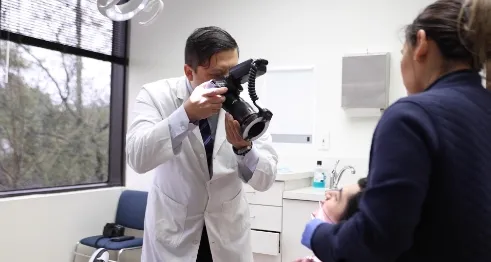Cleft Lip & Cleft Palate Surgery Houston
Comfortable, Effective Cleft Solutions

If your child has cleft lip or palate, you are likely worried about their health and development, but you may not even know where to get started helping them. If you live in the greater Houston area, the oral surgeons at Piney Point Oral & Maxillofacial Surgery of Houston can help you understand the condition and get your child the care they need to ensure they grow up healthy and smile happily.
When you’re ready to find out more, you can keep reading to get some of the basic information about cleft lip and cleft palate surgery in Houston. Our team will be happy to answer your questions or schedule a consultation visit, so don’t hesitate to reach out.
Why Choose Piney Point Oral & Maxillofacial Surgery of Houston for Cleft Lip & Cleft Palate Surgery?
- Compassionate, Caring Surgical Team
- Convenient & Informative Virtual Consultations
- Highly Credentialed, Expert Team of Oral Surgeons
Understanding Cleft Lip & Cleft Palate
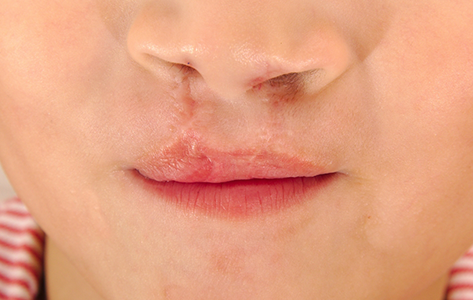
Orofacial clefts typically occur due to the congenital development of tissue gaps in the roof of the mouth, along the dental arch, or on the lips. When facial abnormalities occur during development, kids may have trouble with many basic daily functions. This is especially impactful during early development for infants and toddlers.
When only the soft tissues of the face are involved in a cleft, it is likely a cleft lip. This type of cleft is a small gap or indentation in the lip, or it can continue into the nose. Lip cleft can occur as one sided or two sided. Cleft palate is a large gap or a small hole in the roof of the mouth and may involve both hard and soft palates.
Causes of Cleft Lip & Palate

During pregnancy, your child develops their lips and palate in the second or third month. The cells that develop these structures fuse together, creating orofacial structures and preparing your child for the outside world. Sometimes, the cells do not fuse properly, leading to a cleft in the palate or lip.
There is no one cause, but in many cases, a cleft lip or palate is due to genetic factors passed down through a gene from the mother or father. Even if the parent was born without a cleft, they may still have the gene, and they are at higher risk of having a child with cleft lip or palate. Sometimes, environmental factors for the expecting mother, like smoking or inadequate levels of folic acid, may contribute to the defect.
Whatever the causes of cleft lip or palate, the caring team and trusted oral surgeons in Houston will be happy to provide effective treatment to repair clefts.
Risk Factors for Cleft Palate & Lip

Some of the risk factors associated with the development of cleft palate and lip include:
- Family history
- Substance exposure (alcohol, smoking, medications, etc.)
- Diabetes
- Obesity
It’s not possible to avoid clefts altogether. However, for parents who are trying to get pregnant and those who are newly pregnant, there are a number of steps you can take to reduce the chances that your child will develop cleft lip or cleft palate in Houston. This is especially important if the mother or father was born with a cleft. Some steps you can take include:
Attend a Preconception Checkup

If you are thinking about becoming pregnant, you should visit a doctor for a preconception checkup. The physician will evaluate your health and alert you to any risk factors you have that might affect the success of your pregnancy and your future baby’s wellbeing. Armed with that information, you’ll be able to make wise choices before and during your pregnancy.
If you or your partner have a genetic predisposition for clefts, make sure to let your physician know during this preconception checkup visit, so they can offer feedback with this in mind. If you are already expecting, make sure you talk to your physician about clefts early in the pregnancy and follow any directions they give you to help ensure your child’s healthy development.
Take Folic Acid

Folic acid is a key nutrient that every cell in the human body needs in order to grow and develop properly. A lack of folic acid during pregnancy has been connected to a number of birth defects, including cleft lip and palate. Expecting mothers should begin taking a folic acid supplement when they are actively trying to become pregnant and continue to take it throughout the first trimester of pregnancy. Most prenatal vitamins contain adequate levels of folic acid, so if you’re taking a prenatal multivitamin, make sure to talk to your physician before adding more folic acid into your daily routine.
Don’t Smoke or Drink Alcohol

Smoking and alcohol consumption during pregnancy can both contribute to a child’s development of cleft lip and cleft palate. If you smoke, try to quit before you get pregnant, but if you are struggling, talk to your doctor about help with cessation. Smoking pulls a number of harsh chemicals into the body, and toxins in these chemicals can be passed to your growing child.
You should also stop or limit your alcohol consumption when you are trying to become pregnant, but if you haven’t done so and you’re already pregnant, make sure to cease drinking alcohol completely as soon as your pregnancy is confirmed. At the very least, you should never binge drink (have more than four drinks in two or three hours) because binge drinking in early pregnancy has been particularly connected to cleft lip and cleft palate.
Consider Your Medications

During your preconception or early pregnancy medical exams, your doctor should talk to you about any medications you take and how they can impact your pregnancy. Some medications have been connected with cleft lip and cleft palate.
You may need to ask your doctor about stopping certain medications or switching to alternatives that carry a lower risk for your unborn child. There are also a range of over-the-counter medications that may negatively impact your child’s early development, so make sure to discuss all medications, whether or not they’re prescribed, with your doctor.
Manage Your Overall Health

If you have chronic health conditions, your doctor will talk to you about ways to manage these concerns throughout pregnancy. Health issues like diabetes, obesity, and certain types of chronic infection may all contribute to an increased risk for your child to develop an orofacial cleft. For this reason, you should do your best to take care of your body on a daily basis throughout pregnancy.
What Happens if My Child Does Develop a Cleft?
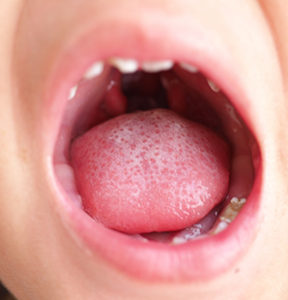
Of course, parents are going to do all they can to ensure their children are healthy throughout gestation and after delivery. Still, there is a small chance that your baby will be born with a cleft lip or plate. If your baby does have a cleft, reach out to the oral surgeons at Piney Point Oral & Maxillofacial Surgery of Houston. They have experience with treating cleft lip and cleft palate cases for kids of all ages, and they can perform cleft surgery in Houston to repair these conditions.
Your child doesn’t have to deal with the long-term complications of clefts. Your oral surgeons offer surgical correction, and the team will happily partner with other specialists to ensure your child gets all of the care they need to lead a healthy life.
Types of Clefts
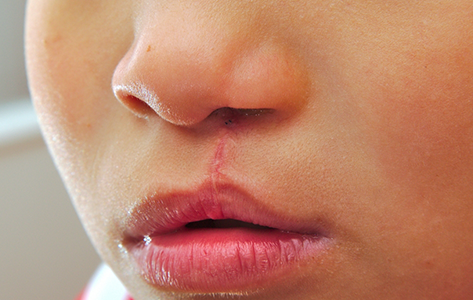
When it comes to understanding orofacial clefts, there are some basic terms to review. There can be either unilateral or bilateral clefts. As the names imply, unilateral clefts only impact one side of the mouth and bilateral clefts impact both sides of the mouth. In addition to unilateral and bilateral clefts, there are also complete and incomplete clefts. Incomplete cleft lips stop before reaching the nose and complete cleft lips extend to the nose. Similarly, incomplete cleft palate is a small hole in the tissue on the top of the mouth, and a complete cleft palate is a very large gap in the top of the mouth that often leads to a cleft lip.
The five most common types of cleft are:
- Cleft palate only
- Unilateral cleft lip – a cleft on one side of the lip (complete or incomplete)
- Bilateral cleft lip – a cleft on both sides of the lip (complete or incomplete)
- Unilateral cleft lip and palate – a cleft that extends from the palate to the lip on one side of the mouth
- Bilateral cleft lip and palate – a cleft that extends from the palate to the lip on both sides of the mouth
Cleft Lip & Palate Complications
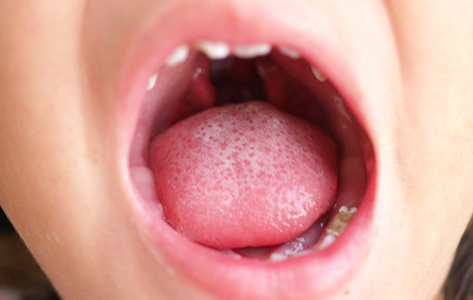
As a new or expecting parent, you have a lot of worries on your plate, but the biggest concern shared by parents is that their child will not be healthy. While only one in a thousand children are born with cleft lip or palate, this malformation of the oral and facial structures can lead to significant concern as your child develops.
Many parents worry about their child’s appearance, but aesthetics is not the only concern. Left untreated, there are a number of serious cleft lip and palate complications. This section discusses some of the complications that come along with cleft lip and palate and how treatment from your oral surgeons in Houston at Piney Point Oral & Maxillofacial Surgery of Houston may be able to prevent them.
Feeding Difficulties

The palate, which is the roof of the mouth, plays an important role in the feeding process for infants whether you choose to bottle or breastfeed. There may be either a partial or complete cleft in the palate, and the infant may find it extremely difficult to feed because the child cannot produce enough suction to take in the breastmilk or baby formula. A Houston oral surgeon may be able to repair this problem within the first year or two of a baby’s life, depending on the child’s health, facial structure development, and individual needs.
Speech and Language Problems

Cleft lip and palate can cause a decrease in muscle function, which in turn can make it difficult for children to learn to speak properly. The malformation of the lip and palate may extend to the development of teeth and function of the jaw, leading kids to struggle to clearly form certain sounds, or there may be delays in learning to speak at all. A speech therapist may be able to help with such issues to a degree, but a consultation with an oral surgeon in Houston, who may be able to repair the cleft lip and palate, is also recommended.
Someone with a cleft lip or palate may also have an overly nasally voice. This occurs because the palate does not properly separate the mouth from the nose, allowing air to escape through the nose during speech. Working with speech therapists and additional dental or medical interventions may be necessary to improve your child’s ability to communicate.
Ear Infections and Hearing Loss
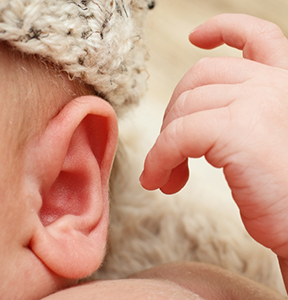
Ear infections are quite common in children with cleft lip and/or cleft palate. The ear tissue may become infected or inflamed due to improperly angled eustachian tubes, which connect the sinuses and nasal area to the ears. The improper angle of the eustachian tubes allows food and other substances to seep into the ear, leading to repeated ear infections. The infections, in turn, may lead to a degree of hearing loss.
The most common type of hearing loss in children with cleft palate is known as glue ear, wherein a sticky fluid builds up in the middle ear. The buildup stops sound from passing from the middle ear to the inner ear, which can lead to partial deafness. Glue ear is usually temporary and can occur in children both with and without cleft palate, but it often persists for much longer in children with cleft palate.
If your child complains of ear pain or shows signs of hearing loss, you should schedule an appointment with an otolaryngologist (ear, nose, and throat doctor) right away.
Dental Problems
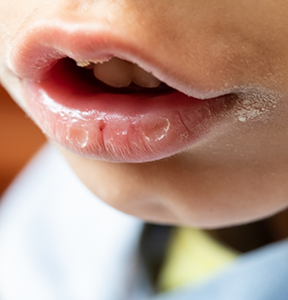
Improper tooth development is very common in children who have cleft lip or cleft palate. Due to abnormalities in the facial structures of children with clefts, teeth may not be able to erupt in the ideal position. The teeth may come in misaligned and require orthodontic treatment later on, or the palate may be too narrow, which can cause severe underbite and other issues with the alignment of your bite.
Addressing Cleft Lip and Palate Complications
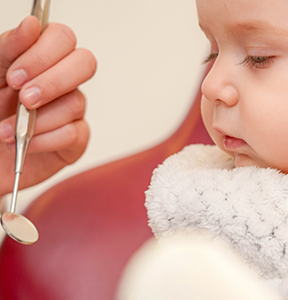
If your child has cleft lip and/or cleft palate, bring them to see your Houston oral surgeons for a consultation. At Piney Point Oral & Maxillofacial Surgery of Houston, the team has the expertise and experience required to address such issues and enable children to enjoy an improved appearance and a reduced risk for the abovementioned complications. Reach out to the office today to learn more about how your Houston oral surgeons may be able to help your child. The surgeons also take a team approach to treating clefts, so they will work with other local specialists to ensure your child gets the full spectrum of care they need to lead a healthier life.
Diagnosis & Treatment of Cleft Lip & Palate
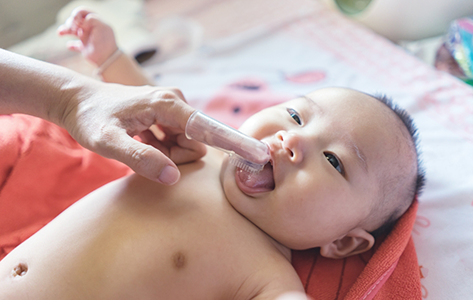
At Piney Point Oral & Maxillofacial Surgery of Houston, the team works with multiple specialists to improve the quality of life for cleft lip and palate patients. Normally, an otolaryngologist, an oral and maxillofacial surgeon, a plastic surgeon, an orthodontist, a nutritionist, and a speech pathologist are all members of the team who will work with patients and parents to create a healthier, more functional smile.
Diagnosis of Cleft Lip & Palate
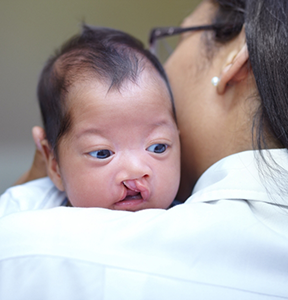
Most cases of cleft lip and palate are easily diagnosed shortly after delivery. In many cases, the clefts are visible even before birth. An ultrasound, especially one captured by newer, clearer imaging systems, will often reveal a cleft lip or palate while your baby is still in the womb.
While the vast majority of cleft cases are diagnosed very early in life, certain types of cleft lip and palate are less visible, and they may not be diagnosed until later in life. Patients who have an incomplete cleft palate only are more likely to receive diagnosis well after birth unless they struggle during feeding.
Treating Cleft Lip & Cleft Palate
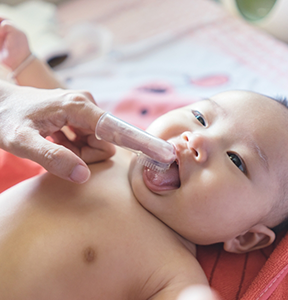
The appropriate treatment for the cleft palate or lip will depend on the severity of the individual case. Often, one of the oral surgeons in Houston can help to repair the cleft. When diagnosed during pregnancy or at birth, a cleft repair surgery will typically be recommended before the age of 1 or 1.5 years old.
Cleft lip should be repaired as early as possible, typically before the first birthday. Surgery will help to repair both appearance and function of the oral structures, making it easier to feed and breathe and aiding in speech and language development later on. Several procedures may be needed throughout childhood to fully repair cleft lip and cleft palate as the teeth, jaws, and other oral and facial structures develop. With appropriate treatment, it is very possible to repair the cleft and achieve healthy form and function.
Team Approach to Treatment
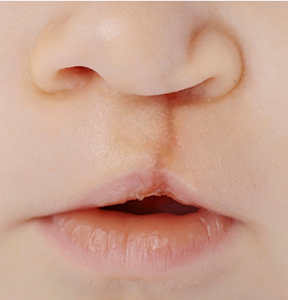
At Piney Point Oral & Maxillofacial Surgery of Houston, the Houston oral surgeons take a team approach to treatment for cleft lip or palate. Treatments can begin as soon as three months old in certain cases. The team will work alongside plastic surgeons, pediatric dentists and orthodontists, nutritionists, speech pathologists, lactation experts, dieticians, otolaryngologists (ear, nose, and throat doctors), and other specialists to create a custom treatment plan for every patient.
Phases of Treatment
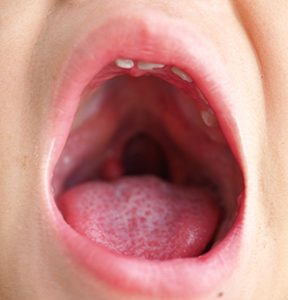
While every individual’s treatment plan will vary, phases of cleft treatment typically include:
- Cleft lip correction is usually performed between three and six months of age and no later than one year old.
- Cleft palate correction is performed between nine months and one year old.
- Bone grafts are when permanent teeth begin to develop, patients who had a cleft palate repair earlier in life may need bone grafts to adequately support teeth.
- Orthodontics (including orthognathic surgery) can assist many patients with cleft lip or palate to correct bite alignment. Early intervention orthodontics include palatal expanders, traditional orthodontics (braces), and orthognathic surgery to repair the shape or position of the jaw.
- Cosmetic procedures can benefit patients as they grow older and are able to be more active in planning treatment. We can treat non-functional aspects of cleft lip and palate, such as scarring, with the help of a dermatologist or plastic surgeon.
-
Speech therapy can help children begin talking. It’s essential to work with speech pathologists at the earliest indication that children may be experiencing difficulty speaking clearly. Speech difficulties are common among kids who had cleft repair.
Cleft Lip & Palate FAQs
How Common is Cleft Lip or Cleft Palate?
Cleft palate with or without clef lip occurs once in 1,000 live births. Cleft palate and lip are most common in Native American and African Americans, but research suggests orofacial clefts are more preventable during gestation Native Americans. About 20% of clefts only affect the lip and 30% only affect the palate. The remaining 50% of clefts are combined.
Why Does Cleft Lip and Palate Occur?
Clefts occur very early in the pregnancy, during the first three months as the cells that make up facial tissues are forming. In most cases, one or both parents’ genetics determine whether or not a child will be born with cleft lip or palate, but environmental factors are also impactful. Drinking, smoking, lacking good, nutritious foods, and other elements will play a role in determining whether or not a child (with or without the genetic predisposition) develops a cleft, so talk to your doctor about preventive steps you can take during pregnancy.
Why is Surgical Intervention for Cleft Lip or Palate Performed?
An oral surgeon may recommend surgical cleft repair if your child is having difficulty while bottle or breastfeeding. Feeding difficulties prevent the child from consuming adequate calories and nutrients. As your child begins to speak, clefts can cause significant impediments and lack of clarity, during communication. Clefts may also adversely impact the development of properly aligned teeth, and they have been connected to chronic ear infections and hearing problems.
At What Age Should Cleft Lip or Palate Be Repaired?
Your Houston oral surgeons perform soft tissue only cleft lip repair for very young patients, typically when they are infants or toddlers. For more serious complete cleft palate or a combined cleft lip and palate, it may be advantageous for the team to wait until the age of eight or older to perform the surgery. This allows them to see how the teeth are developing and ensure the corrective surgery does not unnecessarily impact healthy dental development.
Who Performs the Surgery?
One of the trusted oral surgeons at Piney Point Oral & Maxillofacial Surgery of Houston will perform the procedure, but they always take a team approach to your treatment plan. They may work with different specialists, including a plastic surgeon, audiologist (hearing doctor), anesthesiologist (sedation), orthodontist and a general dentist, and in many cases, an otolaryngologist (ear, nose, and throat doctor).
How is Cleft Lip or Palate Surgery Done?
The procedure involves closing the gap in the bone or soft tissue. This will typically require a tissue graft. Depending on the complexity of the case and individual needs, the oral surgeon may harvest tissue from other parts of the body, utilize donated tissue, or place synthetic tissue.
Is a Cleft Palate or Lip Dangerous?
For the most part, there is no pain or discomfort caused by clefts, but there are dangers that arise later in life. Chronic ear infections, airway obstructions, speech difficulties, and struggles with consuming foods are all common side effects of cleft palate and lip. It’s almost always best to seek treatment for these conditions in childhood to ensure healthy development.
Does Cleft Lip or Palate Affect Facial and Dental Development Later in Life?
Many people with cleft lip and palate have upper jaw restriction later in life due to the narrowness of their palates after cleft repair. They may also have an underdeveloped dental arch and abnormal height. This condition often causes people to develop an extreme underbite. When the person is around 16 to 19 years old, orthognathic surgery to correct jaw deformities is often recommended.
Additionally, phase 1 orthodontics may be recommended for children who have cleft palate or lip repair. This early orthodontic intervention helps the teeth to develop closer to proper alignment, making it easier for orthodontists to create the ideal alignment of individual teeth and the full bite later. Palatal expanders are the most common phase 1 orthodontic treatment recommended for kids who have clefts. These orthodontic appliances are used to expand the palate, ensuring there is adequate space for the development of healthy adult teeth.
How Long Does Cleft Palate or Lip Surgery Take?
Depending on the complexity of the case, cleft surgery will take two to six hours. During the planning stages of your child’s treatment, their oral surgeon will explain the process to you and provide a basic estimate of surgery time.
How Long Does Cleft Lip or Palate Surgery Take to Heal?
Most kids will be back to their usual activities in about a month. In the long term, there will likely be some discoloration and minimal scar tissue visible after your child has fully recovered from the cleft lip or palate procedure.
Will My Child Be Uncomfortable During Cleft Surgery?
Not at all. There are several procedures that may be necessary to correct a cleft lip or palate at various stages throughout your child’s development, but oral surgery is completed with modern anesthesia and sedation, which ensures that your child will be completely comfortable and unaware of what is going on around them.
What is the Cost of Clef Palate or Lip Surgery?
The cost of cleft surgery is entirely dependent upon the individual situation, and a knowledgeable team member will walk you through the costs before they get started with your child’s treatment plan. In most cases, these procedures receive coverage through medical and dental insurance policies, and your oral surgeon’s team will be able to help you maximize these benefits to offset out-of-pocket costs.
Wisdom Teeth Extraction Oral & Maxillofacial Pathology Oral Cancer Screenings Orthognathic Surgery Dental Implants Pre-Prosthetic Surgery Facial Trauma Treatment Apicoectomy Surgery TMJ Treatment Corrective Orthodontic Surgery Sleep Apnea Treatment Cosmetic Facial Treatments Anesthesia & Sedation Dentistry Emergency Dentistry View Our Services

